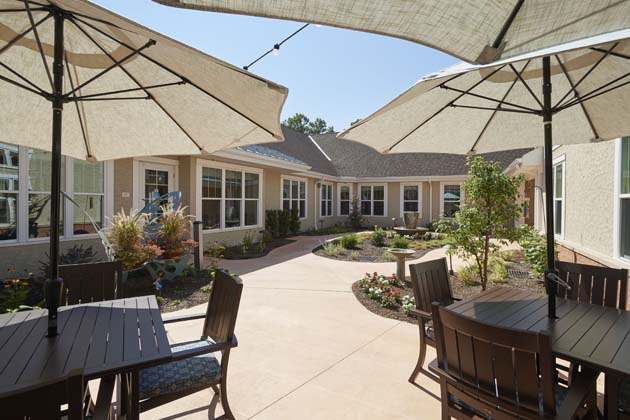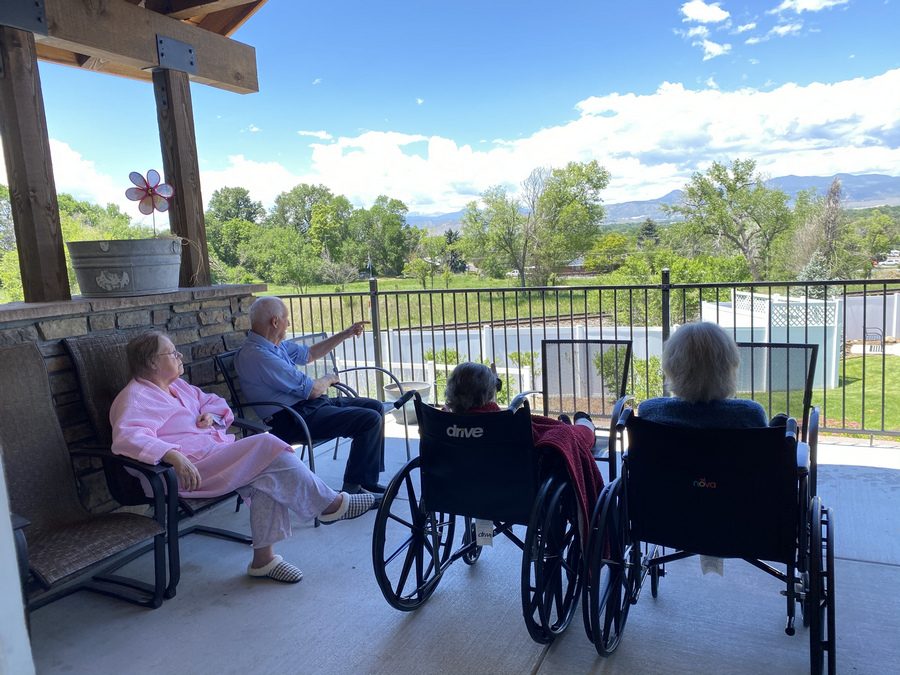Top Reasons to Choose Personalized Memory Care Over Standard Care
Top Reasons to Choose Personalized Memory Care Over Standard Care
Blog Article
Everything About Memory Care Services: Why Tiny Memory Treatment Houses Are an Excellent Selection
Memory care solutions play an essential function in supporting individuals with Alzheimer's and dementia. Small memory treatment homes attract attention for their tailored technique and intimate setting. With lower staff-to-resident proportions, these homes foster more powerful connections and customized treatment. Citizens benefit from improved social interactions and a risk-free setting. As family members explore alternatives, recognizing the special advantages of little memory treatment homes ends up being important. What aspects should be thought about when selecting the ideal home?
Recognizing Memory Care Services
While lots of may be acquainted with general elderly care options, recognizing memory treatment solutions is essential for households encountering the obstacles of cognitive decrease. Memory care specifically caters to individuals with problems such as Alzheimer's illness and other forms of mental deterioration. These solutions provide an organized atmosphere that focuses on enhancing the high quality of life for locals with specialized care and support.Memory treatment facilities are created to guarantee security and security, often featuring safeguarded environments to avoid straying. Trained team member are offered all the time to assist with everyday tasks, medicine administration, and personal treatment. In addition, memory care programs often include cognitive excitement tasks, customized to engage citizens and promote psychological wellness. Family members can profit from understanding these solutions, as they make it possible for informed choices regarding their liked ones' treatment, making sure that their details requirements and choices are attended to in a thoughtful and helpful fashion.
The Advantages of Tiny Memory Treatment Residences
Little memory treatment homes use distinctive benefits that can significantly improve the high quality of life for citizens with cognitive disabilities. One considerable advantage is the intimate setting, which permits tailored interactions amongst staff and homeowners. This smaller setting fosters purposeful partnerships, decreasing feelings of seclusion and stress and anxiety commonly experienced by individuals with memory issues.Additionally, the lower staff-to-resident ratio in tiny memory care homes allows caretakers to offer even more alert guidance and support. This technique not only enhances safety yet additionally advertises a feeling of safety for the residents.Moreover, tiny memory care homes can adjust quickly to the special needs and choices of each resident, enabling an extra homelike ambience. Such an environment can urge social interaction and engagement in tasks, ultimately enhancing the daily experiences of those living with cognitive problems.
Personalized Care Plans for Homeowners
Individualized care plans are essential in memory care homes, as they accommodate the one-of-a-kind requirements and choices of each resident. These plans begin with thorough analyses carried out by competent specialists, who assess cognitive capacities, case history, and personal interests. This customized method assurances that care is not only effective but also respectful of each individual's self-respect and autonomy.Moreover, personalized treatment strategies are adaptable, permitting modifications as locals' needs advance in time. This versatility fosters a complacency and familiarity, which is necessary for people living with memory challenges. Caretakers are educated to apply these plans constantly, providing support that aligns with the locals' routines and preferences.Ultimately, individualized treatment strategies boost the lifestyle for locals by promoting freedom, engagement, and wellness, making them an essential element of memory care solutions in tiny memory care homes.
Creating a Home-Like Setting
Developing a home-like setting is crucial for promoting comfort and experience in memory treatment settings, as it significantly affects residents' emotional wellness. Little memory treatment homes often prioritize personalized touches, such as cozy color palettes, family images, and acquainted furniture arrangements, which help citizens really feel extra secure. Including aspects reminiscent of a conventional home, like comfy living spaces and communal locations, urges a feeling of belonging.Moreover, using natural light and outside spaces can enhance the atmosphere, advertising leisure and tranquility. Staff members play a considerable role in maintaining this atmosphere by involving with citizens in a caring manner, treating them like family members. Routine tasks, such as cooking or gardening, can also add to a home-like feel, supplying chances for homeowners to take part in meaningful experiences. In general, producing a nurturing atmosphere supports cognitive function and psychological security, making it an essential element of memory care services.
Enhanced Social Interaction and Area
Improved social communication and community are crucial components of memory care solutions. By cultivating individualized social involvement and creating a family-like ambience, these services promote purposeful connections among citizens. Group occasions and tasks even more encourage engagement, aiding people feel extra included and sustained.
Personalized Social Involvement
While social communication is essential for overall well-being, lots of individuals with memory disabilities often have a hard time to engage meaningfully with others. Personalized social interaction in memory treatment homes addresses this obstacle by creating customized activities that accommodate locals' unique interests and capacities. By focusing on individual choices, caretakers can promote connections that resonate deeply Read Full Report with everyone. Activities such as art treatment, music sessions, and guided discussions advertise cognitive stimulation and psychological expression. In addition, little team settings encourage friendship and enable for more intimate communications, improving feelings of belonging. This approach not only fights sensations of isolation yet also empowers homeowners to preserve a sense of identity, eventually contributing to enhanced psychological wellness and lifestyle.
Family-like Ambience
In a memory care setup, promoting a family-like ambience significantly improves social communication and constructs a sense of area amongst homeowners. Smaller memory care homes commonly focus on intimate atmospheres, permitting citizens to create closer links with each other and employee. This nurturing ambience advertises count on, which is vital for people with memory problems. Homeowners are much more likely to involve in discussions and share experiences, creating a supportive network that relieves feelings of loneliness. The experience of shared spaces and routines adds to a feeling of belonging, further encouraging social communication (personalized memory care). In such setups, psychological bonds grow, resulting in boosted overall health and a better of life for homeowners as they navigate their daily experiences with each other
Group Activities and Events

Safety And Security and Security Features in Small Residences
Lots of tiny homes made for memory treatment include necessary security and safety attributes to assure the well-being of homeowners. These homes frequently use safe access and leave factors to protect against wandering, a common problem among people with memory impairments. Furthermore, surveillance systems and alarm mechanisms boost surveillance, ensuring that personnel can promptly react to any type of unusual activities.Interior designs are customized for safety, with lessened hazards such as sharp corners and clutter-free paths. Handrails and non-slip flooring are generally set up to lower the threat of falls. Employee are trained in emergency methods, ensuring they are planned for numerous situations.Moreover, individualized treatment strategies may include evaluation of individual safety needs, offering tailored options for every resident. On the whole, these safety and protection functions produce a nurturing atmosphere where citizens can grow while preserving their dignity and independence.
How to Pick the Right Memory Treatment Home
Just how can family members guarantee they select one of the most suitable memory care home for their liked ones? site The decision needs cautious consideration of numerous factors. Initially, households need to assess the facility's personnel credentials and training, guaranteeing that caregivers are experienced in managing memory-related conditions. Next, it's important to examine the home's atmosphere, focusing on safety features and whether it promotes a feeling of community and belonging. Seeing the facility can offer understanding into everyday activities and the social ambience, which are necessary for psychological stimulation and psychological wellness. Additionally, households need to ask about the treatment plans offered, ensuring they are tailored to specific needs. Thinking about the home's place and accessibility for family sees can contribute to a smoother change. By attending to these elements, family members can make an enlightened decision that prioritizes their enjoyed one's convenience and lifestyle in a memory care setup.
Frequently Asked Questions
What Certifications Should Team Members in Memory Treatment Residences Have?
Personnel in memory care homes must possess pertinent certifications, experience in mental deterioration care, solid communication abilities, and compassion. Recurring training in behavioral administration and therapeutic treatments boosts their capacity to support locals efficiently.
How Do Memory Care Services Differ From Typical Assisted Living?
Memory treatment solutions concentrate especially on people with memory disabilities, providing specific support and structured atmospheres. In contrast, traditional assisted living supplies basic assistance with day-to-day activities, lacking the customized approach needed for those with cognitive obstacles.
What Sorts of Tasks Are Provided in Memory Treatment Houses?
Memory treatment homes normally use a range of activities designed to engage homeowners. Typical options consist of art treatment, music sessions, cognitive games, physical workouts, horticulture, and gatherings, all focused on enhancing wellness and cognitive function.
Can Homeowners Bring Their Own Items to Memory Care Houses?
Homeowners can generally bring their very own belongings to memory care homes, enabling them to customize their space - personalized memory care. This method assists develop a familiar setting, advertising comfort and a sense of identity for the individuals

Just How Are Member Of The Family Associated With the Care Process?
Relative play a necessary duty in the treatment process, typically taking part in decision-making, going to treatment meetings, and supplying emotional support. Their participation promotes a collective environment, improving the citizen's general well-being and lifestyle. While lots of may be acquainted with basic senior treatment options, comprehending memory treatment solutions is necessary for family members facing the difficulties of cognitive decline. These solutions give a structured atmosphere that concentrates on improving the high quality of life for residents with specialized treatment and support.Memory care centers are designed to assure safety and safety, usually including protected atmospheres to avoid wandering. Personalized treatment strategies are important in memory care homes, as they provide to the distinct needs and preferences of each resident. Team members in memory care homes should have relevant accreditations, experience in dementia care, solid communication abilities, and empathy. Memory care services concentrate especially on click for info people with memory disabilities, providing specific assistance and organized settings.
Report this page